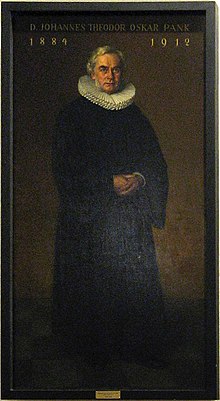Oskar Pank
Johannes Theodor Oskar Pank (born May 2, 1838 in Leuthen , † April 14, 1928 in Schachen / Bodensee ) was a German-Sorbian Protestant theologian.
Live and act
The son of the Sorbian pastor Christian (Kito) Pank (1808–1895) and his wife Selma geb. Bähr (1812–1895) attended high school in Cottbus , where the oral Abitur examination was waived for excellent performance. He studied Protestant theology at the Universities of Halle and Berlin . During his studies he was a member of the 1856 Schwarzenburg Bund - connection Tuiskonia Hall . In 1861 the Church of the Old Prussian Union appointed him to the parish of Schorbus ( Skjarbošc , today part of Drebkau ) in the Spreewald , where he preached in both German and Sorbian . In 1869 he was appointed pastor of the newly built church of the Golgotha congregation in Berlin , where he had to look after 2,000 people with pastoral care. In 1878 he was transferred to the Berlin Trinity Church and at the same time promoted to superintendent of the diocese (church district) Friedrichswerder . During this time he became the personal confessor of the German Chancellor Otto von Bismarck , whose house was in this district.
At the endeavors of the Mayor of Leipzig Otto Georgi , he succeeded the preacher Friedrich Ahlfeld at Leipzig's Nikolaikirche in 1882 . Just two years later he was promoted to First Pastor of the St. Thomas Church there and Superintendent of Leipzig. Ex officio he was a member of the first chamber of the Saxon state parliament , in which he represented the Protestant regional church alongside the court preacher. In a state parliament debate on the turning point in 1896, he vehemently defended the Sorbian language and demanded that pastors who could speak the Sorbian language continue to be needed.
Pank is an avid supporter of church building and the founding of new parishes in the city, which grew by leaps and bounds at the end of the 19th century. He also initiated the introduction of children's services and the construction of the deaconess mother house in 1890 and the deaconess hospital .
From 1900 to 1908 he was chairman of the Gustav Adolf Foundation . Until his retirement on June 1, 1912, the Secret Council Pank remained loyal to the city of Leipzig, even though it had been offered, among other things, the position of General Superintendent of Magdeburg.
The city of Leipzig recognized Pank for his work in 1909 with the award of honorary citizenship .
Works
- Temporal life in the light of the Eternal Word. Berlin 1879.
- From the Chronicle of the Spreewald. 1883.
- Sermons held in the St. Nikolaikirche in Leipzig. Berlin 1884.
- The Gospel of Matthew interpreted in sermons and homilies. 2 volumes. Bremen, Leipzig 1889–1891.
- Bismarck booklet. Bielefeld, Leipzig 1885.
- In memory of D. Gustav Adolf Fricke . 1908.
- I am not ashamed of the gospel of Christ. Hall 1910.
- Our war devotions on Sundays, in the morning and in the evening, at Christmas, New Year's Eve and New Year, and on special occasions during the war in 1915/16. Leipzig, Reichenbach 1915.
- Oskar Pank (Ed.): In the Bismarck house: memories. 1929.
literature
- Franz Blanckmeister : The old helmsman. Remembering Oskar Pank. Saxon Publishing Company, Leipzig 1928
- Hans-Jürgen Sievers: builder of his church. Superintendent Oskar Pank and his commitment to the community, Diakonie and Gustav-Adolf-Werk. Evangelische Verlags-Anstalt, Leipzig 1998, ISBN 3-374-01677-4
- Hans-Jürgen Sievers: Oskar Pank - Wendish pastor in the Spreewald, superintendent in Berlin and Leipzig , in: Madlena Norberg, Peter Kosta (ed.): Domownja / Heimat - Sorbian / Wendish perspectives on Lausitz . (= Podstupimske pśinoski k Sorabistice = Potsdam contributions to Sorabistics; 9). University of Potsdam, Potsdam 2009, pp. 81–92 ( full text )
- Hans-Jürgen Sievers: Pank, Johannes Theodor Oskar . In: Institute for Saxon History and Folklore (Ed.): Saxon Biography .
- Oskar Pank. In: Lausitzer Rundschau from April 14, 2008
Web links
- Literature by and about Oskar Pank in the catalog of the German National Library
Individual evidence
- ^ Leopold Petri (ed.): Directory of members of the Schwarzburgbund. Fourth edition, Bremerhaven 1908, p. 78, no.1670.
- ^ Josef Matzerath : Aspects of Saxon State Parliament History. Presidents and members of parliament from 1833 to 1952. Saxon State Parliament, Dresden 2001, p. 47
| predecessor | Office | successor |
|---|---|---|
| Gustav Adolf Fricke | President of the Gustav-Adolf-Verein 1900–1908 |
Bruno Hartung |
| personal data | |
|---|---|
| SURNAME | Pank, Oskar |
| ALTERNATIVE NAMES | Pank, Johannes Theodor Oskar (full name) |
| BRIEF DESCRIPTION | German Protestant theologian |
| DATE OF BIRTH | May 2, 1838 |
| PLACE OF BIRTH | Leuthen |
| DATE OF DEATH | April 14, 1928 |
| Place of death | Schachen / Lake Constance |
